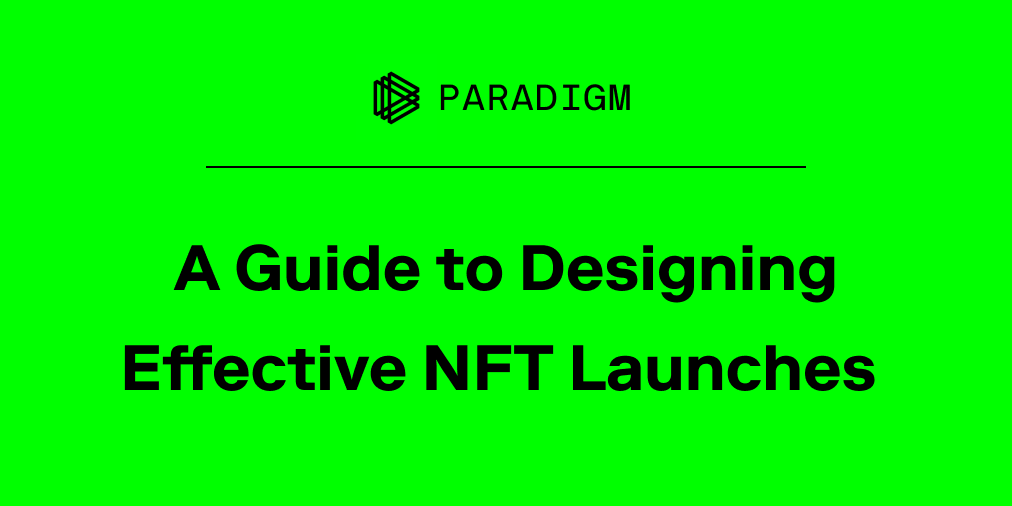
I'm excited to release a mega-post that @_anishagnihotri and I have been hacking away at for the last few weeks:
Paradigm's Guide to Designing Effective NFT Launches!
paradigm.xyz/2021/10/a-guid…
Paradigm's Guide to Designing Effective NFT Launches!
paradigm.xyz/2021/10/a-guid…

All NFT launches face similar challenges (e.g. pricing, randomness, gas-efficiency...), causing design patterns to emerge.
An anti-pattern is a common response to a problem that is ineffective or even counter-productive.
An anti-pattern is a common response to a problem that is ineffective or even counter-productive.
We start by highlighting anti-patterns in NFT-land that have been harming users in the wild.
For example, "More Loot" used transparent metadata. This allowed savvy users to rank items by scarcity before minting them and snipe only the rarest ones.
(x: time, y: scarcity)
For example, "More Loot" used transparent metadata. This allowed savvy users to rank items by scarcity before minting them and snipe only the rarest ones.
(x: time, y: scarcity)

A second example is first-come-first-served (FCFS) sales with a fixed price.
Last month's Times NFT launch sold out in less than three minutes, excluding regular users completely. Worse, we found that 10,962 users lost 252 ETH ($800k!) across 12,743 reverted transactions.
Last month's Times NFT launch sold out in less than three minutes, excluding regular users completely. Worse, we found that 10,962 users lost 252 ETH ($800k!) across 12,743 reverted transactions.
From looking at the damage from bad launch designs, we derive six desirable properties of an NFT launch:
🎲 Unexploitable fairness
🏎️ No race conditions
🌍 Time-zone agnostic
⛽️ Gas-efficient
🤝 Inclusive
👮 Trustless
🎲 Unexploitable fairness
🏎️ No race conditions
🌍 Time-zone agnostic
⛽️ Gas-efficient
🤝 Inclusive
👮 Trustless
But how can we do better?
At the center is our realization that *every* NFT launch consists of the same four steps:
1) Bidding: Users submit bids
2) Clearing: Winners are determined
3) Distribution: Winners receive NFTs
4) Metadata reveal: Properties of NFTs are revealed
At the center is our realization that *every* NFT launch consists of the same four steps:
1) Bidding: Users submit bids
2) Clearing: Winners are determined
3) Distribution: Winners receive NFTs
4) Metadata reveal: Properties of NFTs are revealed
For example, in the highly common FCFS fixed-price sale, users submit bids to miners, who are tasked with clearing them every block.
Turning this continuous process into a sequential one (e.g. a raffle or batched auction) leads to much better outcomes.
Turning this continuous process into a sequential one (e.g. a raffle or batched auction) leads to much better outcomes.
Using a methodical approach, we break down each phase (bidding, clearing, distribution, and metadata reveal). We explain what options developers have, and how their choices affect the design goals of their launch.
"Do as I do, not as I say":
We also provide MultiRaffle, a reference implementation that we consider a good balance between all properties and that is simple to understand and build upon!
github.com/Anish-Agnihotr…
We also provide MultiRaffle, a reference implementation that we consider a good balance between all properties and that is simple to understand and build upon!
github.com/Anish-Agnihotr…
We would love to see NFT developers start experimenting with these ideas, leading to a better variety of launches in the wild.
A huge shoutout to those who have been sharing their tools and advice with the NFT community already:
A huge shoutout to those who have been sharing their tools and advice with the NFT community already:
@VitalikButerin - for his explainer on the problems of FCFS fixed-price sales
vitalik.ca/general/2021/0…
vitalik.ca/general/2021/0…
@dotta - for advice on building a robust frontend
https://twitter.com/dotta/status/1420372022790483979
@jaypegsautomart - for demoing novel batched auction approaches (part 1)
https://twitter.com/josephdelong/status/1437426536043454464?s=20
@ameensol - for demoing novel batched auction approaches (part 2)
https://twitter.com/ameensol/status/1437474410659651586?s=20
@ParallelNFT - for showcasing best practices with off-chain raffling
https://twitter.com/Jeremystormsky/status/1421915852727885825?s=20
FairDrop - for sharing their proof-of-concept design of fair raffles
fairdrop.0xessential.com
fairdrop.0xessential.com
@0xmons - for advice and tooling around designing fair launches
https://twitter.com/0xmons/status/1409640045829447686?s=20
Did we miss any other good threads, concepts, or launches? Please reach out to us on Twitter @hasufl and @_anishagnihotri so we can all build a great resource together.
Finally, make sure to follow my co-author @_anishagnihotri, one of the most brilliant hackers I've ever met. Anish spends most of his time building public goods for the community and his knowledge about NFTs and Defi is truly unparalleled.
• • •
Missing some Tweet in this thread? You can try to
force a refresh




